La Trobe University ACC3AFA: Advanced Financial Accounting Report
VerifiedAdded on 2022/08/27
|7
|1486
|24
Report
AI Summary
This report delves into advanced financial accounting, examining the regulation of accounting information from both the free-market and pro-regulation perspectives. It presents arguments supporting each viewpoint, providing a comprehensive overview of the debate. Furthermore, the report explores two key theories used to evaluate social and environmental accounting: organizational legitimacy theory and stakeholder theory. It compares and contrasts these frameworks, assessing their strengths and potential deficiencies in explaining social and environmental accounting practices. The report concludes with a synthesis of the findings, highlighting the significance of accounting theories in understanding the financial direction of a company and developing long-term strategies.
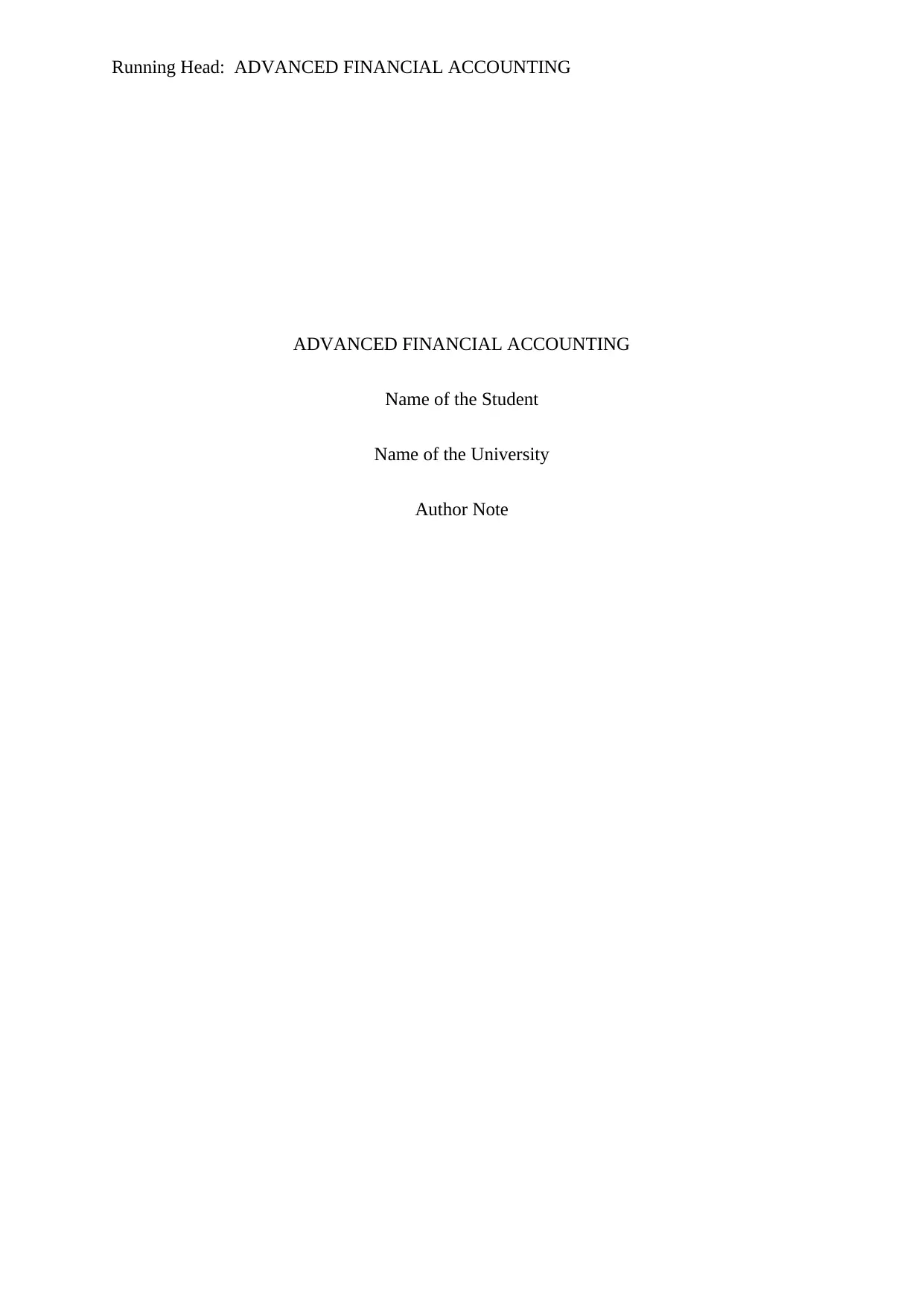
Running Head: ADVANCED FINANCIAL ACCOUNTING
ADVANCED FINANCIAL ACCOUNTING
Name of the Student
Name of the University
Author Note
ADVANCED FINANCIAL ACCOUNTING
Name of the Student
Name of the University
Author Note
Paraphrase This Document
Need a fresh take? Get an instant paraphrase of this document with our AI Paraphraser
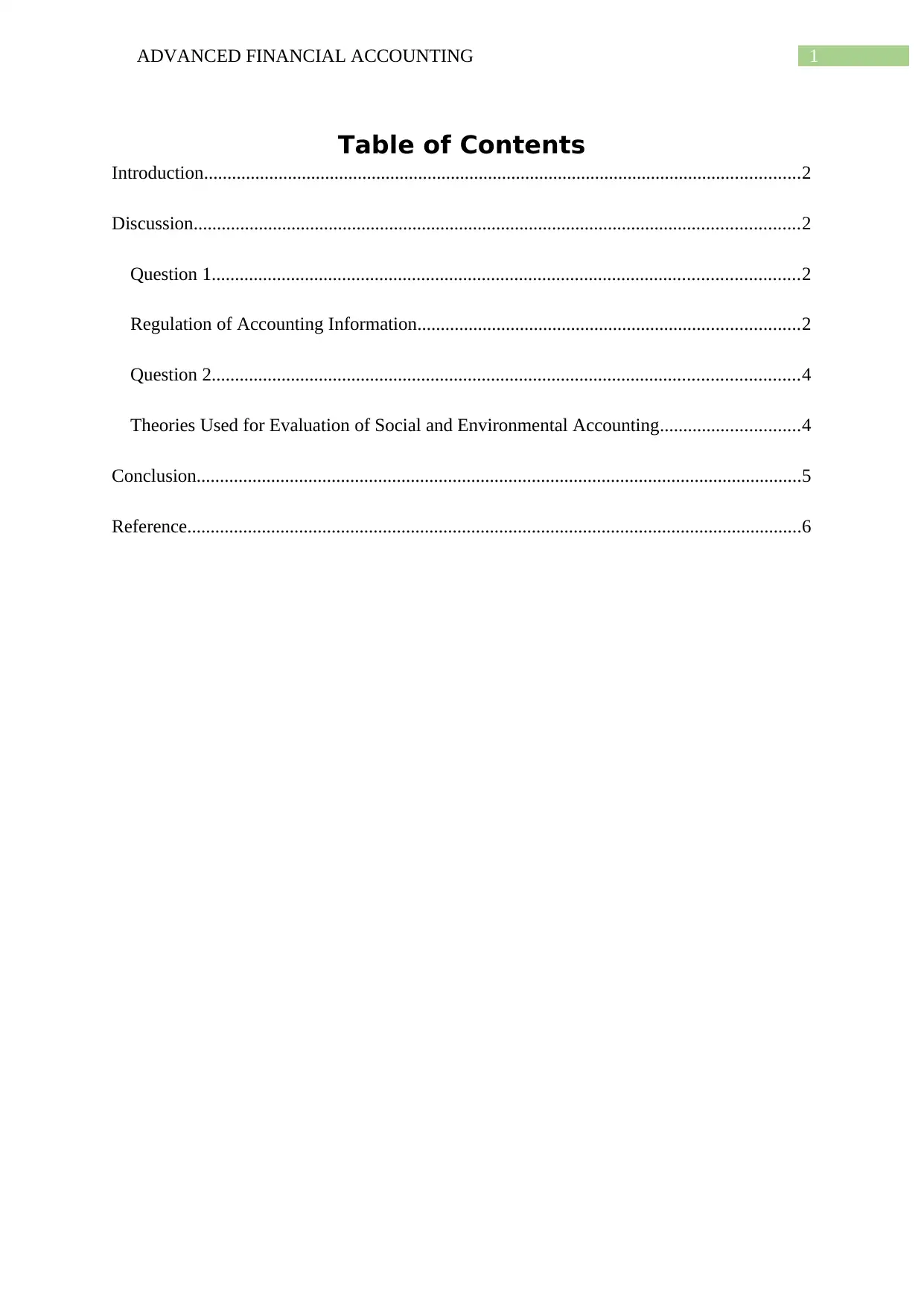
1ADVANCED FINANCIAL ACCOUNTING
Table of Contents
Introduction................................................................................................................................2
Discussion..................................................................................................................................2
Question 1..............................................................................................................................2
Regulation of Accounting Information..................................................................................2
Question 2..............................................................................................................................4
Theories Used for Evaluation of Social and Environmental Accounting..............................4
Conclusion..................................................................................................................................5
Reference....................................................................................................................................6
Table of Contents
Introduction................................................................................................................................2
Discussion..................................................................................................................................2
Question 1..............................................................................................................................2
Regulation of Accounting Information..................................................................................2
Question 2..............................................................................................................................4
Theories Used for Evaluation of Social and Environmental Accounting..............................4
Conclusion..................................................................................................................................5
Reference....................................................................................................................................6
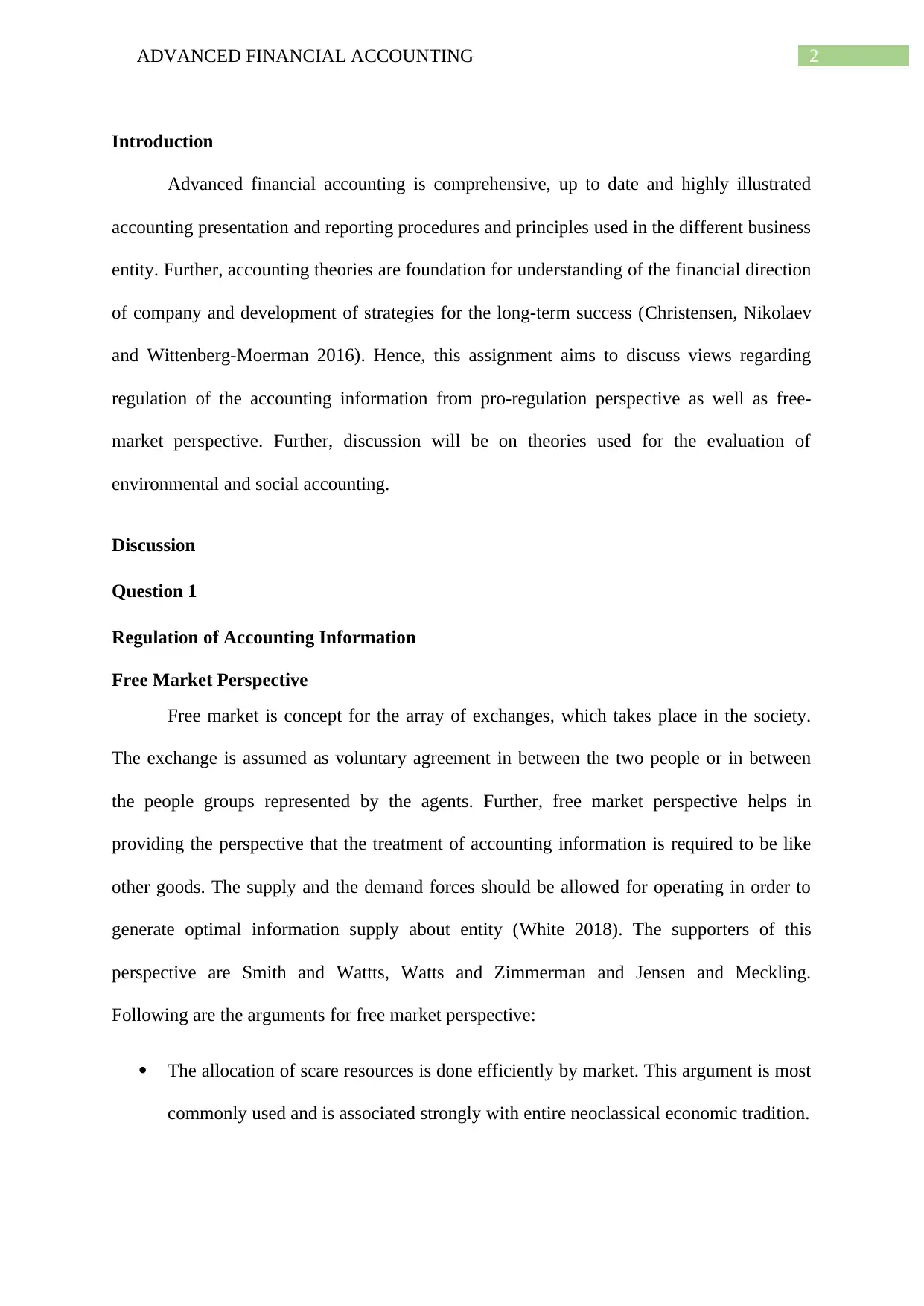
2ADVANCED FINANCIAL ACCOUNTING
Introduction
Advanced financial accounting is comprehensive, up to date and highly illustrated
accounting presentation and reporting procedures and principles used in the different business
entity. Further, accounting theories are foundation for understanding of the financial direction
of company and development of strategies for the long-term success (Christensen, Nikolaev
and Wittenberg‐Moerman 2016). Hence, this assignment aims to discuss views regarding
regulation of the accounting information from pro-regulation perspective as well as free-
market perspective. Further, discussion will be on theories used for the evaluation of
environmental and social accounting.
Discussion
Question 1
Regulation of Accounting Information
Free Market Perspective
Free market is concept for the array of exchanges, which takes place in the society.
The exchange is assumed as voluntary agreement in between the two people or in between
the people groups represented by the agents. Further, free market perspective helps in
providing the perspective that the treatment of accounting information is required to be like
other goods. The supply and the demand forces should be allowed for operating in order to
generate optimal information supply about entity (White 2018). The supporters of this
perspective are Smith and Wattts, Watts and Zimmerman and Jensen and Meckling.
Following are the arguments for free market perspective:
The allocation of scare resources is done efficiently by market. This argument is most
commonly used and is associated strongly with entire neoclassical economic tradition.
Introduction
Advanced financial accounting is comprehensive, up to date and highly illustrated
accounting presentation and reporting procedures and principles used in the different business
entity. Further, accounting theories are foundation for understanding of the financial direction
of company and development of strategies for the long-term success (Christensen, Nikolaev
and Wittenberg‐Moerman 2016). Hence, this assignment aims to discuss views regarding
regulation of the accounting information from pro-regulation perspective as well as free-
market perspective. Further, discussion will be on theories used for the evaluation of
environmental and social accounting.
Discussion
Question 1
Regulation of Accounting Information
Free Market Perspective
Free market is concept for the array of exchanges, which takes place in the society.
The exchange is assumed as voluntary agreement in between the two people or in between
the people groups represented by the agents. Further, free market perspective helps in
providing the perspective that the treatment of accounting information is required to be like
other goods. The supply and the demand forces should be allowed for operating in order to
generate optimal information supply about entity (White 2018). The supporters of this
perspective are Smith and Wattts, Watts and Zimmerman and Jensen and Meckling.
Following are the arguments for free market perspective:
The allocation of scare resources is done efficiently by market. This argument is most
commonly used and is associated strongly with entire neoclassical economic tradition.
⊘ This is a preview!⊘
Do you want full access?
Subscribe today to unlock all pages.

Trusted by 1+ million students worldwide
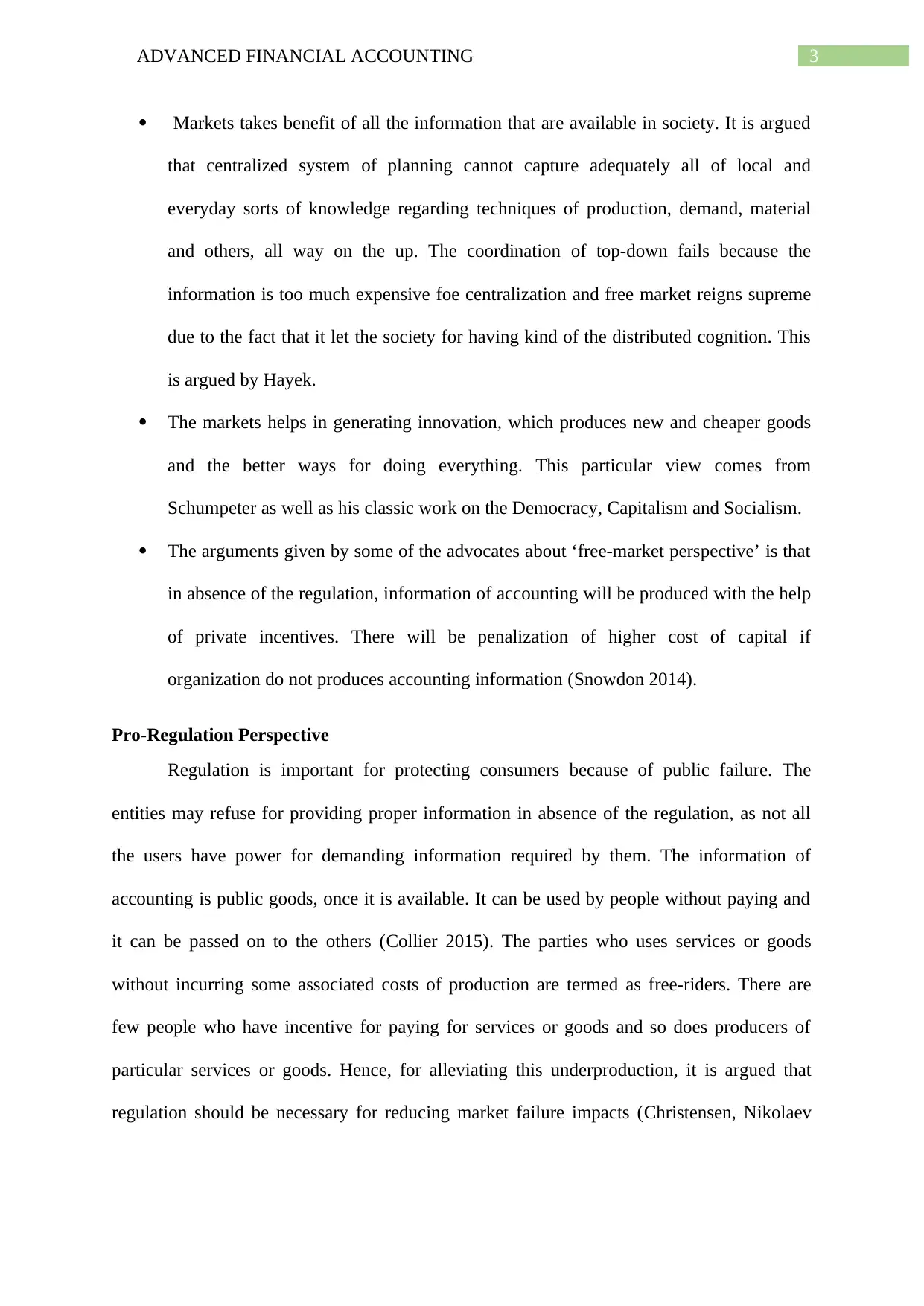
3ADVANCED FINANCIAL ACCOUNTING
Markets takes benefit of all the information that are available in society. It is argued
that centralized system of planning cannot capture adequately all of local and
everyday sorts of knowledge regarding techniques of production, demand, material
and others, all way on the up. The coordination of top-down fails because the
information is too much expensive foe centralization and free market reigns supreme
due to the fact that it let the society for having kind of the distributed cognition. This
is argued by Hayek.
The markets helps in generating innovation, which produces new and cheaper goods
and the better ways for doing everything. This particular view comes from
Schumpeter as well as his classic work on the Democracy, Capitalism and Socialism.
The arguments given by some of the advocates about ‘free-market perspective’ is that
in absence of the regulation, information of accounting will be produced with the help
of private incentives. There will be penalization of higher cost of capital if
organization do not produces accounting information (Snowdon 2014).
Pro-Regulation Perspective
Regulation is important for protecting consumers because of public failure. The
entities may refuse for providing proper information in absence of the regulation, as not all
the users have power for demanding information required by them. The information of
accounting is public goods, once it is available. It can be used by people without paying and
it can be passed on to the others (Collier 2015). The parties who uses services or goods
without incurring some associated costs of production are termed as free-riders. There are
few people who have incentive for paying for services or goods and so does producers of
particular services or goods. Hence, for alleviating this underproduction, it is argued that
regulation should be necessary for reducing market failure impacts (Christensen, Nikolaev
Markets takes benefit of all the information that are available in society. It is argued
that centralized system of planning cannot capture adequately all of local and
everyday sorts of knowledge regarding techniques of production, demand, material
and others, all way on the up. The coordination of top-down fails because the
information is too much expensive foe centralization and free market reigns supreme
due to the fact that it let the society for having kind of the distributed cognition. This
is argued by Hayek.
The markets helps in generating innovation, which produces new and cheaper goods
and the better ways for doing everything. This particular view comes from
Schumpeter as well as his classic work on the Democracy, Capitalism and Socialism.
The arguments given by some of the advocates about ‘free-market perspective’ is that
in absence of the regulation, information of accounting will be produced with the help
of private incentives. There will be penalization of higher cost of capital if
organization do not produces accounting information (Snowdon 2014).
Pro-Regulation Perspective
Regulation is important for protecting consumers because of public failure. The
entities may refuse for providing proper information in absence of the regulation, as not all
the users have power for demanding information required by them. The information of
accounting is public goods, once it is available. It can be used by people without paying and
it can be passed on to the others (Collier 2015). The parties who uses services or goods
without incurring some associated costs of production are termed as free-riders. There are
few people who have incentive for paying for services or goods and so does producers of
particular services or goods. Hence, for alleviating this underproduction, it is argued that
regulation should be necessary for reducing market failure impacts (Christensen, Nikolaev
Paraphrase This Document
Need a fresh take? Get an instant paraphrase of this document with our AI Paraphraser
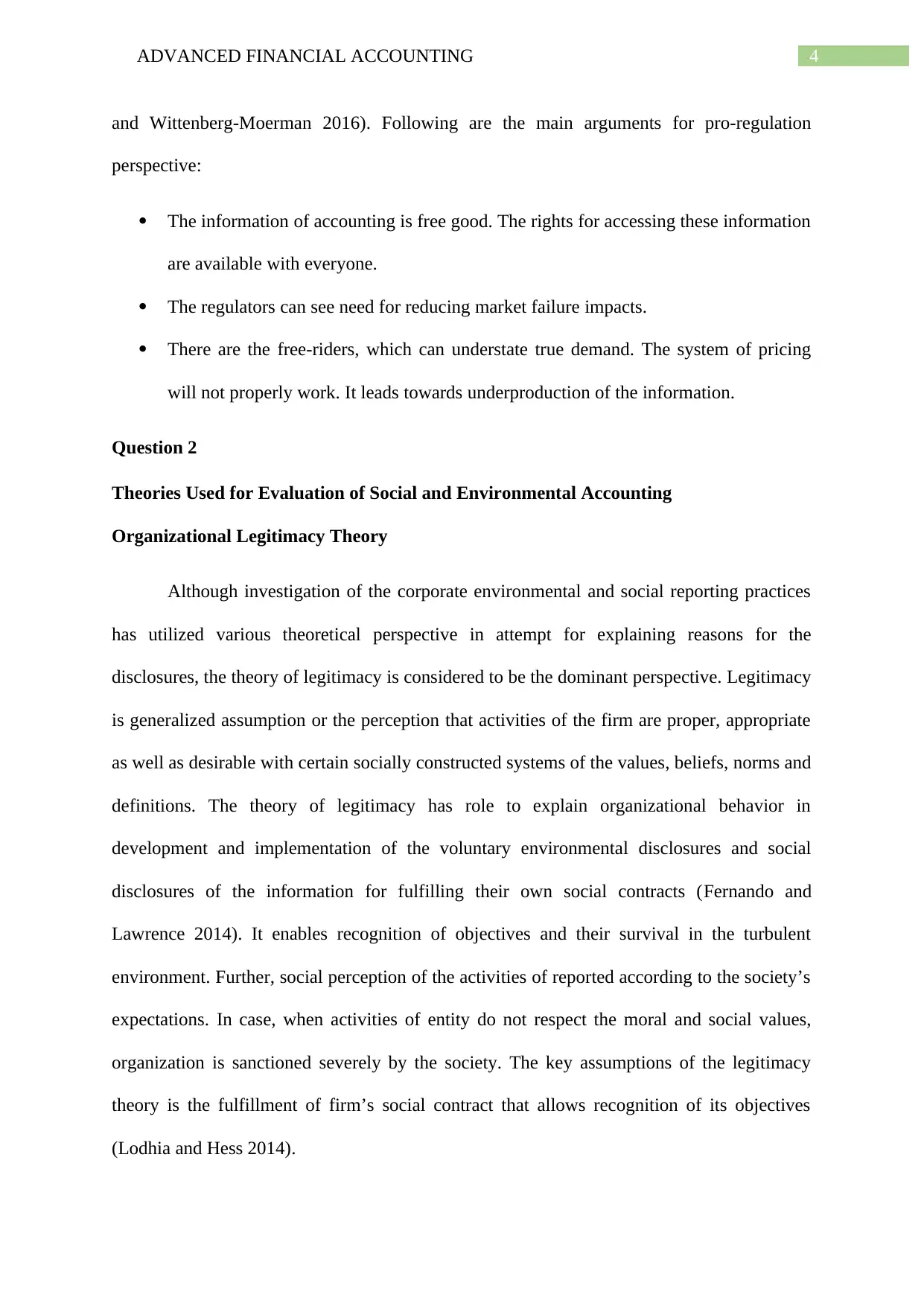
4ADVANCED FINANCIAL ACCOUNTING
and Wittenberg‐Moerman 2016). Following are the main arguments for pro-regulation
perspective:
The information of accounting is free good. The rights for accessing these information
are available with everyone.
The regulators can see need for reducing market failure impacts.
There are the free-riders, which can understate true demand. The system of pricing
will not properly work. It leads towards underproduction of the information.
Question 2
Theories Used for Evaluation of Social and Environmental Accounting
Organizational Legitimacy Theory
Although investigation of the corporate environmental and social reporting practices
has utilized various theoretical perspective in attempt for explaining reasons for the
disclosures, the theory of legitimacy is considered to be the dominant perspective. Legitimacy
is generalized assumption or the perception that activities of the firm are proper, appropriate
as well as desirable with certain socially constructed systems of the values, beliefs, norms and
definitions. The theory of legitimacy has role to explain organizational behavior in
development and implementation of the voluntary environmental disclosures and social
disclosures of the information for fulfilling their own social contracts (Fernando and
Lawrence 2014). It enables recognition of objectives and their survival in the turbulent
environment. Further, social perception of the activities of reported according to the society’s
expectations. In case, when activities of entity do not respect the moral and social values,
organization is sanctioned severely by the society. The key assumptions of the legitimacy
theory is the fulfillment of firm’s social contract that allows recognition of its objectives
(Lodhia and Hess 2014).
and Wittenberg‐Moerman 2016). Following are the main arguments for pro-regulation
perspective:
The information of accounting is free good. The rights for accessing these information
are available with everyone.
The regulators can see need for reducing market failure impacts.
There are the free-riders, which can understate true demand. The system of pricing
will not properly work. It leads towards underproduction of the information.
Question 2
Theories Used for Evaluation of Social and Environmental Accounting
Organizational Legitimacy Theory
Although investigation of the corporate environmental and social reporting practices
has utilized various theoretical perspective in attempt for explaining reasons for the
disclosures, the theory of legitimacy is considered to be the dominant perspective. Legitimacy
is generalized assumption or the perception that activities of the firm are proper, appropriate
as well as desirable with certain socially constructed systems of the values, beliefs, norms and
definitions. The theory of legitimacy has role to explain organizational behavior in
development and implementation of the voluntary environmental disclosures and social
disclosures of the information for fulfilling their own social contracts (Fernando and
Lawrence 2014). It enables recognition of objectives and their survival in the turbulent
environment. Further, social perception of the activities of reported according to the society’s
expectations. In case, when activities of entity do not respect the moral and social values,
organization is sanctioned severely by the society. The key assumptions of the legitimacy
theory is the fulfillment of firm’s social contract that allows recognition of its objectives
(Lodhia and Hess 2014).
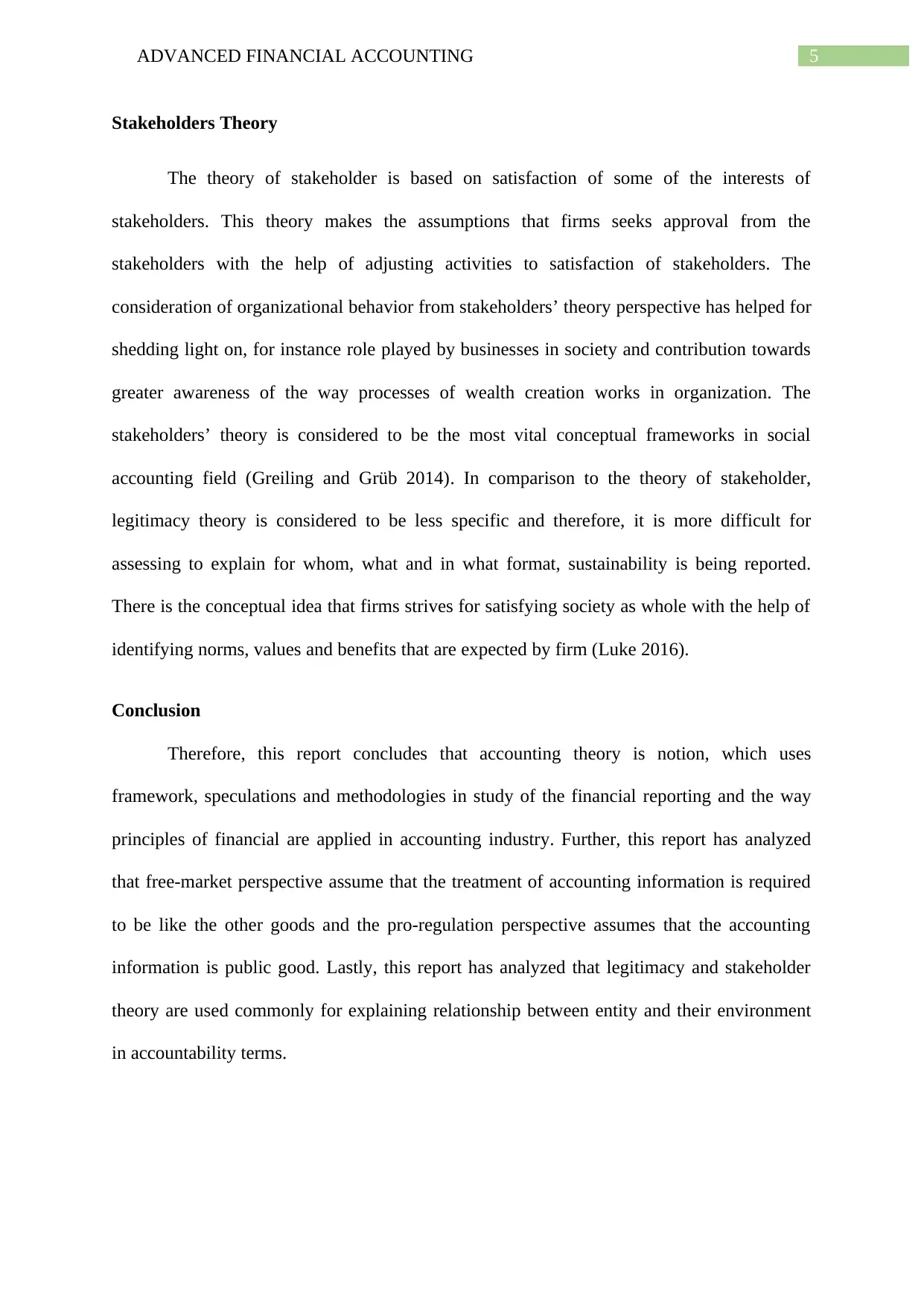
5ADVANCED FINANCIAL ACCOUNTING
Stakeholders Theory
The theory of stakeholder is based on satisfaction of some of the interests of
stakeholders. This theory makes the assumptions that firms seeks approval from the
stakeholders with the help of adjusting activities to satisfaction of stakeholders. The
consideration of organizational behavior from stakeholders’ theory perspective has helped for
shedding light on, for instance role played by businesses in society and contribution towards
greater awareness of the way processes of wealth creation works in organization. The
stakeholders’ theory is considered to be the most vital conceptual frameworks in social
accounting field (Greiling and Grüb 2014). In comparison to the theory of stakeholder,
legitimacy theory is considered to be less specific and therefore, it is more difficult for
assessing to explain for whom, what and in what format, sustainability is being reported.
There is the conceptual idea that firms strives for satisfying society as whole with the help of
identifying norms, values and benefits that are expected by firm (Luke 2016).
Conclusion
Therefore, this report concludes that accounting theory is notion, which uses
framework, speculations and methodologies in study of the financial reporting and the way
principles of financial are applied in accounting industry. Further, this report has analyzed
that free-market perspective assume that the treatment of accounting information is required
to be like the other goods and the pro-regulation perspective assumes that the accounting
information is public good. Lastly, this report has analyzed that legitimacy and stakeholder
theory are used commonly for explaining relationship between entity and their environment
in accountability terms.
Stakeholders Theory
The theory of stakeholder is based on satisfaction of some of the interests of
stakeholders. This theory makes the assumptions that firms seeks approval from the
stakeholders with the help of adjusting activities to satisfaction of stakeholders. The
consideration of organizational behavior from stakeholders’ theory perspective has helped for
shedding light on, for instance role played by businesses in society and contribution towards
greater awareness of the way processes of wealth creation works in organization. The
stakeholders’ theory is considered to be the most vital conceptual frameworks in social
accounting field (Greiling and Grüb 2014). In comparison to the theory of stakeholder,
legitimacy theory is considered to be less specific and therefore, it is more difficult for
assessing to explain for whom, what and in what format, sustainability is being reported.
There is the conceptual idea that firms strives for satisfying society as whole with the help of
identifying norms, values and benefits that are expected by firm (Luke 2016).
Conclusion
Therefore, this report concludes that accounting theory is notion, which uses
framework, speculations and methodologies in study of the financial reporting and the way
principles of financial are applied in accounting industry. Further, this report has analyzed
that free-market perspective assume that the treatment of accounting information is required
to be like the other goods and the pro-regulation perspective assumes that the accounting
information is public good. Lastly, this report has analyzed that legitimacy and stakeholder
theory are used commonly for explaining relationship between entity and their environment
in accountability terms.
⊘ This is a preview!⊘
Do you want full access?
Subscribe today to unlock all pages.

Trusted by 1+ million students worldwide
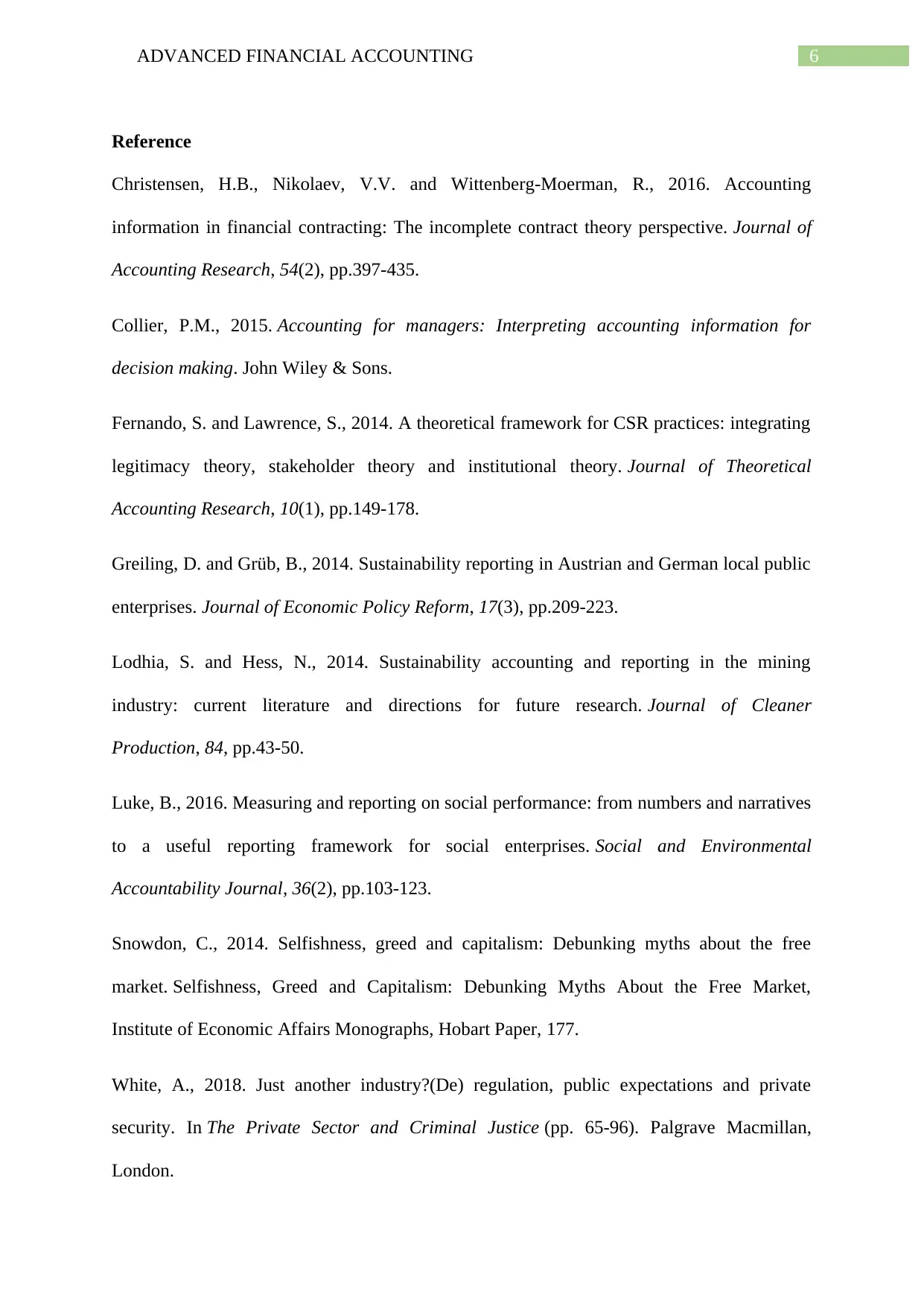
6ADVANCED FINANCIAL ACCOUNTING
Reference
Christensen, H.B., Nikolaev, V.V. and Wittenberg‐Moerman, R., 2016. Accounting
information in financial contracting: The incomplete contract theory perspective. Journal of
Accounting Research, 54(2), pp.397-435.
Collier, P.M., 2015. Accounting for managers: Interpreting accounting information for
decision making. John Wiley & Sons.
Fernando, S. and Lawrence, S., 2014. A theoretical framework for CSR practices: integrating
legitimacy theory, stakeholder theory and institutional theory. Journal of Theoretical
Accounting Research, 10(1), pp.149-178.
Greiling, D. and Grüb, B., 2014. Sustainability reporting in Austrian and German local public
enterprises. Journal of Economic Policy Reform, 17(3), pp.209-223.
Lodhia, S. and Hess, N., 2014. Sustainability accounting and reporting in the mining
industry: current literature and directions for future research. Journal of Cleaner
Production, 84, pp.43-50.
Luke, B., 2016. Measuring and reporting on social performance: from numbers and narratives
to a useful reporting framework for social enterprises. Social and Environmental
Accountability Journal, 36(2), pp.103-123.
Snowdon, C., 2014. Selfishness, greed and capitalism: Debunking myths about the free
market. Selfishness, Greed and Capitalism: Debunking Myths About the Free Market,
Institute of Economic Affairs Monographs, Hobart Paper, 177.
White, A., 2018. Just another industry?(De) regulation, public expectations and private
security. In The Private Sector and Criminal Justice (pp. 65-96). Palgrave Macmillan,
London.
Reference
Christensen, H.B., Nikolaev, V.V. and Wittenberg‐Moerman, R., 2016. Accounting
information in financial contracting: The incomplete contract theory perspective. Journal of
Accounting Research, 54(2), pp.397-435.
Collier, P.M., 2015. Accounting for managers: Interpreting accounting information for
decision making. John Wiley & Sons.
Fernando, S. and Lawrence, S., 2014. A theoretical framework for CSR practices: integrating
legitimacy theory, stakeholder theory and institutional theory. Journal of Theoretical
Accounting Research, 10(1), pp.149-178.
Greiling, D. and Grüb, B., 2014. Sustainability reporting in Austrian and German local public
enterprises. Journal of Economic Policy Reform, 17(3), pp.209-223.
Lodhia, S. and Hess, N., 2014. Sustainability accounting and reporting in the mining
industry: current literature and directions for future research. Journal of Cleaner
Production, 84, pp.43-50.
Luke, B., 2016. Measuring and reporting on social performance: from numbers and narratives
to a useful reporting framework for social enterprises. Social and Environmental
Accountability Journal, 36(2), pp.103-123.
Snowdon, C., 2014. Selfishness, greed and capitalism: Debunking myths about the free
market. Selfishness, Greed and Capitalism: Debunking Myths About the Free Market,
Institute of Economic Affairs Monographs, Hobart Paper, 177.
White, A., 2018. Just another industry?(De) regulation, public expectations and private
security. In The Private Sector and Criminal Justice (pp. 65-96). Palgrave Macmillan,
London.
1 out of 7
Related Documents
Your All-in-One AI-Powered Toolkit for Academic Success.
+13062052269
info@desklib.com
Available 24*7 on WhatsApp / Email
![[object Object]](/_next/static/media/star-bottom.7253800d.svg)
Unlock your academic potential
Copyright © 2020–2025 A2Z Services. All Rights Reserved. Developed and managed by ZUCOL.





